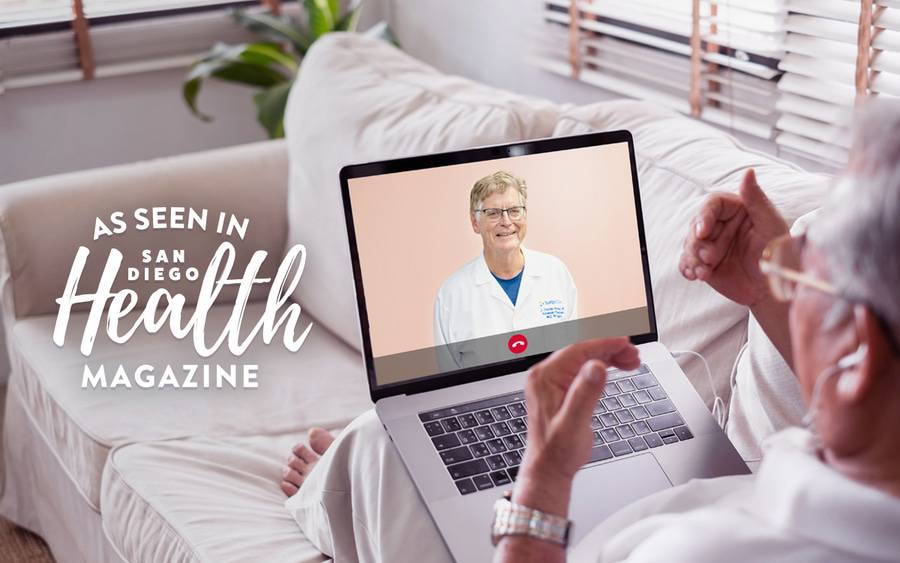Heart Failure Device Offers Peace of Mind
An innovative implantable device lets Scripps remotely monitor people with heart failure

An innovative implantable device lets Scripps remotely monitor people with heart failure
Fred Kunz isn’t your average heart failure patient. When the 82-year-old world traveler is not exploring exotic destinations, he’s shuttling back and forth between three homes in three different cities, which, as you’d imagine, doesn’t leave much time for regular check-ins with his doctor.
Instead, his physician, Thomas Heywood, MD, Scripps Clinic cardiologist and heart failure specialist, monitors his condition remotely through a permanently implanted device called a CardioMEMS and its wireless transmitter (tucked away inside a comfy pillow), which sends real-time digital readings directly to Dr. Heywood’s office.
Remote monitoring offers safeguards and support
The CardioMEMS is a small sensor that monitors changes in pulmonary artery pressure, an early indicator of the onset of worsening heart failure.
Dr. Heywood’s staff checks these regularly, and any significant increases or decreases trigger a phone call or video visit. These may be followed by an office visit if further action is required, though such developments can often be remedied through simple lifestyle changes or adjustments to medication, most often without requiring an in-person appointment.
“It’s like a guardian angel,” Kunz says. “It absolutely gives you peace of mind to know that you’re monitored daily and if there’s any issue, someone is watching. It’s comforting to know somebody’s there for you.”
During COVID, virtual care replaces in-person care
Remote monitoring isn’t exactly new, but before the pandemic it required a physical office visit every few months plus follow-ups for blood work after medication adjustments. Scripps rapidly expanded its telemedicine services in response to COVID-19 so primary care and specialty care physicians could continue to safely care for patients and dispense trusted medical advice in a new way.
As providers transitioned to telehealth, video visits — coupled with more precise data from devices such as CardioMEMS — became a highly effective way to facilitate care, especially for patients like Kunz who are at higher risk for COVID-19 complications.
“Every three to six months we would have him come into the clinic, but with COVID-19 he couldn’t do that,” Dr. Heywood says. “When we know what the pressures are, we can basically do what we’d been doing, but instead of having him come in, we can talk to him on the phone or see him on a video screen.”
Convenient, comprehensive care for complex conditions
Kunz says the remote monitoring process is easy. He chooses a comfortable chair to set up the pillow transmitter, which will alert him if it’s not in the right position. He sits down, presses the start button, and the machine does the rest, notifying him once the data is successfully transmitted.
“The whole process takes 10 minutes at most,” he says. Then he can trust that Dr. Heywood’s staff will be in contact shortly after if anything seems out of sorts — or to simply check in and say hi. “Particularly with COVID-19 and in quarantine where we want to limit doctor or hospital visits as much as possible, it’s a great advantage,” Kunz adds.
Studies show that CardioMEMS monitoring devices reduce hospitalizations by about a third. To date, Scripps has implanted nearly 300 of them, more than any other health care system in the world. Scripps is also participating in a nationwide study to determine whether CardioMEMS devices are also linked to a longer life span.
Life-changing technology lets patients live their lives
Life-changing technology lets patients live their lives
“To me, Dr. Heywood is an angel, and so is his assistant who calls me. I feel that I am getting the utmost care and I’m so blessed.”
Fred KunzHeart failure patients benefit greatly from the use of digital technology. Dr. Heywood says this type of care is great for patients like Kunz who are on the go.
“If he’s in Palm Springs or up in the mountains, obviously it’s quite a drive for him to come in,” Dr. Heywood explains. “It’s much more convenient if I can take care of him with the CardioMEMS. I tell people who have heart failure that I want it to be their hobby, not the center of their life, and this device helps.”
Heart failure is very common — it affects more than 5 million Americans. Scripps cardiovascular specialists are nationally recognized for their work in diagnosing and treating heart failure. Dr. Heywood and his colleagues have decades of experience helping people overcome heart problems and manage chronic conditions.
“To me, Dr. Heywood is an angel, and so is his assistant who calls me,” Kunz says. “I feel that I am getting the utmost care and I’m so blessed.”
This content appeared in San Diego Health, a publication in partnership between Scripps and San Diego Magazine that celebrates the healthy spirit of San Diego.